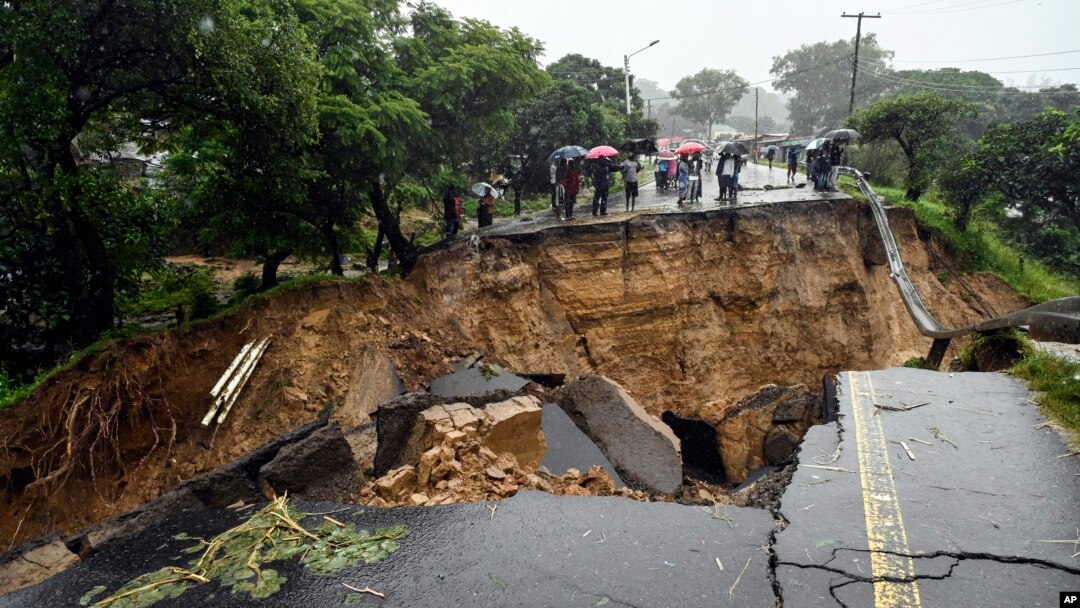"We found people in the trees, on rooftops or on higher grounds," Red Cross Malawi spokesman Felix Washoni told AFP.
"It's a challenge to reach them, water is high and bridges are broken."
Malawi's disaster management department said in a statement that the death toll from the second hit stood at 225, up from 190 on Tuesday, with 707 people injured and 41 missing, as heavy rain continued to affect several parts of the southern African country.
Malawian President Lazarus Chakwera appealed on Wednesday for world support to tackle "a national tragedy" unleashed by Cyclone Freddy as he visited areas ravaged by the exceptional storm.
"I appeal for more assistance from international partners and donors," Chakwera said at a funeral ceremony for some of the victims in the Blantyre township of Chilobwe.
"This is a national tragedy that has affected every one of us."
In neighboring Mozambique at least 21 people had died as of Tuesday, according to the disaster agency.
Rescue workers warned more victims were to be expected as they scoured destroyed neighborhoods for survivors even as hopes dwindled.
"Four people from my family are still missing as they are buried in the mud," Alabu Wiseman, 24, said speaking from a school turned temporary shelter in Malawi.
The government said the army and police were leading search and rescue operations, which the Red Cross said would continue for at least another two days, said the Red Cross.
Freddy returned to southeastern Africa at the weekend for a second time in less than three weeks, leaving behind a trail of death and destruction.
Many people perished in mudslides that washed away homes in southern city of Blantyre, the country's commercial capital.
Across Malawi, nearly 59,000 people have been affected and more than 19,000 displaced, with many now sheltering in schools and churches.
- 'Devastated nation' -
On Wednesday, markets and shops were starting to open again in Blantyre.
"I have two young daughters to feed," Daud Chitumba, 27, a minibus conductor told AFP as he headed to work at a local bus depot.
His house was among dozens that were swept away by a mudslide in the township of Chilobwe.
"We have to rebuild our lives and it starts with picking up the small pieces. So, I have to come to work and try to do whatever I can to move forward," Chitumba said.
President Lazarus Chakwera, who returned to Malawi on Tuesday after attending a UN conference in Qatar, was due to visit affected areas on Wednesday.
"We have arrived to a devastated nation," he said in a statement, hailing the relief efforts by volunteers.
Some lamented that government assistance has been slow in coming.
"We feel abandoned here. Just yesterday, we lost two more people who went with the mudslide as they helped to dig up the bodies. People are hungry and tired," said Fadila Njolomole, 19.
"My best friend, her brother, sister and mother went with the mudslide and their bodies have not been found. It's devastating. You can't even mourn."
Cyclone Freddy smashed into landlocked Malawi early Monday after sweeping through Mozambique at the weekend.
The storm has unofficially broken the World Meteorological Organization's benchmark as the longest-lasting tropical cyclone on record, set in 1994 for a 31-day storm named John.
Freddy became a named storm on February 6, making landfall in Madagascar on February 21 and sweeping over the island before reaching Mozambique on February 24, claiming nearly two dozen lives in both countries and affecting nearly 400,000 people.
It then returned to the Indian Ocean and gathered new force over the warm waters, then reversed course to come back much more powerful, packing wind gusts of up to 200 kilometers per hour.
Meteorologists say that cyclones tracking across the entire Indian Ocean are very infrequent - the last occurred in 2000 - and that Freddy's loopback was even more exceptional.
This report was prepared with data from Reuters and Agence France-Presse.


